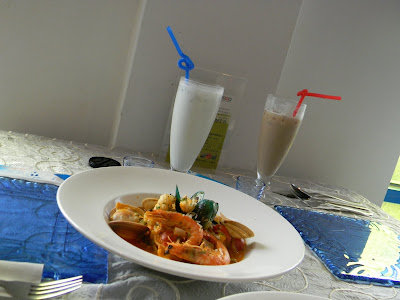Night and Fog, is a Hong Kong film that is set in a planned town called Tin Shui Wai, located in the northwest of Hong Kong. It is loosely based on several homicides that happened in Tin Shui Wai in the last few years. Ling, played by Fujian actress Zhang Jingchu, is a new immigrant that moved to Hong Kong from a rural village in Szechen, China. Ever since 1997, jobs (especially unskilled labors such as construction workers, factory workers) had decreased by a tremandous amount. Many people had lost their job, including Lee (played by Simon Yam, who was originally a blue collar construction worker. In the film, Lee did not have a job and relied on social welfare and Ling worked as a waitress in a small restaurant, in order to provide an extra income for the family. Several cases of financial problems were shown in the film, for example, neither Lee nor Ling was able to pay the kindergarten the "birthday fees" for the twins' birthday party. Lee was a man with high ego that did not want other people to know that his wife supports him.
The movie talked about how the family dispute ended up in a tregedy. Director Ann Hui wanted the show people all the factors that helped contribute a homicide or a domestic abuse. The depressed, middle-aged man's insecure feeling, the new immigrant's heavy Chinese accent, the busy district representative, the police, and the inexperienced social worker all contributed to the tregedy. Ann Hui wanted to point out that the tregedies were not cause by a single madman, but caused by the environment, the condition, and the society.
Ann Hui wanted Hong Kong people to raise a public awareness, because many Hong Kong people are almost being enslaved by the long working hours. Many people simply did not have the energy to deal with other people. The society became cold, people became more distant to another.

This film also attacked the weakness of a man: unwilling to lose face. The first impression of Lee from Mrs. Au was that Lee was loving, caring father; Lee was protrayed as a nice guy when he travelled to Schezhen with Ling and met her family. However, when things did not go well, Lee beat Ling and insulted her, saying that she was ignorant and stupid. This actually happens in many families in Hong Kong.
Both Ling and Lee showed the stereotypical characters in the Chinese society. Ling represented millions of poor Chinese rural women the travelled thousands of miles to seek a job, in order to support the family back home. Many of them work in sweat shop factory in order to support the greedy big brands and the rich people there live across the globe. Lee, on the other hand, is an example of many lower class Hong Kong man that marries a young Chinese girl. Many Chinese considers Hong Kong is a rich place full of gold, as as a result, a Hong Kong man would have a higher social status than a Chinese man.
The police officer's attitude also shown how bad the civil servants' morale and in Hong Kong nowadays. Many Hong Kong people were not happy with the job. They kept their jobs simply for the income. Civil servants (such as police, social workers) are very well paid compared with people working for private industry. Many people did not have passion in their job. The police officer shown in the film was not interested in Ling's issue. After the tregedy, the police lied to the public that Ling did not report the violence to the police, in order to protect their face. There are several real occasions that the police chief had lied to the public and I can share this if I can find the source.
Despite all these negatives aspect from the society, Ling's best friend in Hong Kong, such as Lei, was a strong character that was willing to fight for herselves. She joined the demostration and demostrate about women's right. That showed no matter how bad those conditions were, there were always some people there were willing to fight and stand up for him/herself.
Discrimination is also a major problem in Hong Kong. Even though Hong Kong is made up of most immigrants that moved there for the last 60 years, they still discriminiate against people that they consider as lower class, such as new immigrants from China, South Asian, Black, people with physical and mental disabilities. Ann Hui wanted to show people the problems of the modern Hong Kong society, using this film as an example. This film will probably end up as one of the best film in 2009, at least locally. 8.7/10.





























